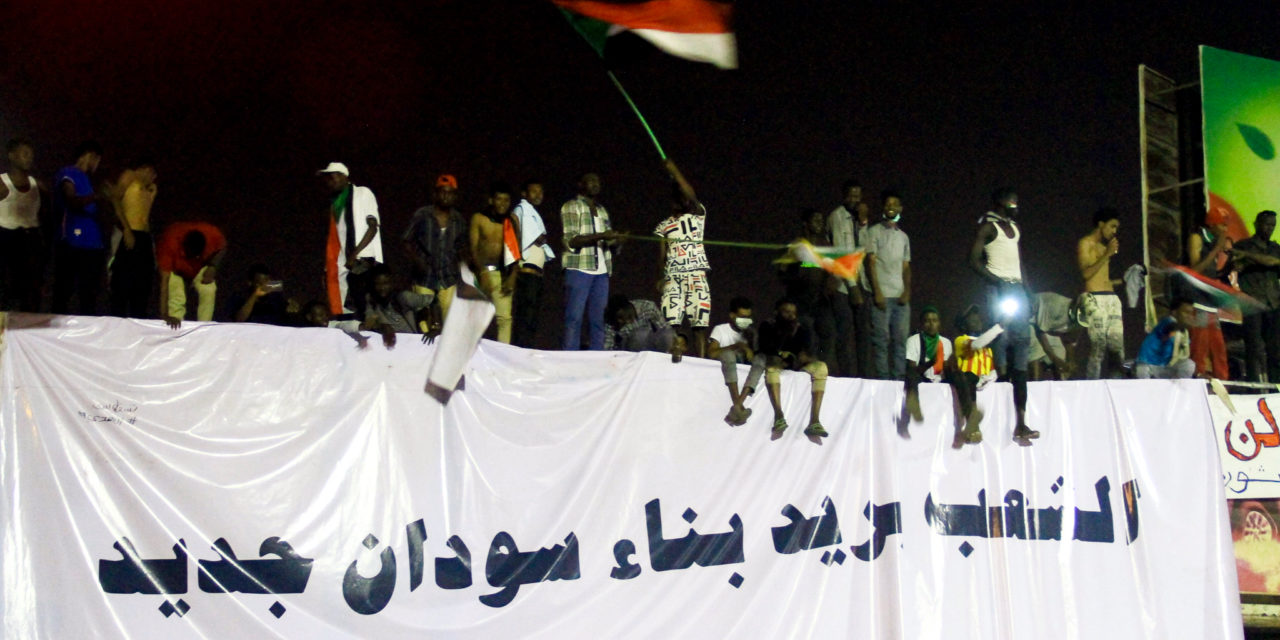“The people want to build a new Sudan.”
(cc) AlAdwaa.Online | Hind Mekki | April 10, 2019
In December 2018 massive nationwide protests swept Sudan as anger over bread prices and a crippling economy grew into a revolution for freedom, peace and justice. A lot has been achieved since then, but several crucial issues are yet to be resolved.
Sudan’s revolution and the ousting of its longtime leader Omar al-Bashir “was arguably the most significant event in Africa in 2019”, writes the BBC. Popular protests not only toppled a leader that had been in power for 30 years but also led to one of the most significant political transformations in the region.
A year later, however, the nation still faces several issues for people considering the revolution as complete. The most common answers to the question of what has not been achieved: no peace and the economic crisis hasn’t been resolved.
These two issues have also been highlighted by Abdalla Didan, a political researcher and former director of the Sudanese Prime Minister’s Office. In an interview with Aladwaa.Online Didan said that peace, which is a crucial prerequisite to Sudan’s stability, development and desired future, has not yet been achieved.
He says that the best way to bring peace is “to recognise the issues impeding peace, engage in negotiations and finally consolidate peace and ensuring its viability”.
The process towards peace
Different civil wars have plagued Sudan since 1955. Didan says that the way out of war and towards building peace is through “national consensus and reconciliation to stop the war by addressing the root causes of the crisis. This hasn’t happened over the past decades of Sudan’s history and ever since its independence.”
He says in his opinion “the important issues that should be discussed by the transitional government to achieve peace are: achieving the requirements of peace, addressing the effects of war, building lasting and comprehensive peace and political and economic development”.
It is precisely these points highlighted by Didan which are part of the political agreement (chapter 6, paragraph 1), signed by the Forces of Freedom and Change (FFC) and the Transitional Military Council (TMC), that outlines the tasks of the transitional government.
“The problem is a historic one, starting already with the independence of Sudan in 1956.”
Professor Suleiman Mohamed al-Dabello
“Effective policies and approaches should be developed to achieve just, and comprehensive peace in Darfur, Blue Nile and South Kordofan regions, in consultation with all armed groups, and just and comprehensive peace, which stops war completely should be achieved by addressing the roots of the Sudanese problem and tackling its impact taking into consideration positive discrimination,” the document states.
In the following paragraph, the same document states that “the comprehensive peace process, referred to in the previous paragraph, should be completed in a period not exceeding six months from the date of signing this agreement”.
Negotiations that have taken place since September 2019 in Juba, the capital of South Sudan, between the transitional government and armed movements that fought the regime of Omar al-Bashir, constitute the process that is supposed to lead to peace as stipulated in the political agreement. However, negotiations have not yet yielded the desired results. This, in turn, has led to an extension of its duration for an additional two months.
The issues impeding peace
Sudan’s civil wars and violent conflicts have various reasons. Experts categorise these reasons as follows: resources, legitimacy, participation and identity. Professor Suleiman Mohamed al-Dabello, Head of the Peace Commission and Rapporteur of the Supreme Peace Council, believes that “the problem is a historical one, starting already with the independence of Sudan in 1956.”
“It relates to identity because throughout this time we did not define it,” al-Dabello adds. “Sometimes, we define ourselves as Arabs, and in other times, we define ourselves as Africans. There are also the issues and problems related to religion, the state, the form of government and the distribution of wealth. All these issues were not established in a way which satisfies all the people of Sudan,” he told the Independent Arabic.
Didan proposes that the peace negotiations in Juba should follow four tracks. “The first track is the ruling and administration system; the second is laws and legislations; the third is economy and development; and the last is security arrangements.” In his opinion, it is important to limit the negotiations to these tracks to stop civil wars and violent conflict in Sudan once and for all.
“We hope we will be able to manage this issue. What happened in Geneina could happen in any city in Sudan.”
Prime Minister Abdallah Hamdok
However, his suggested tracks differ from what is in fact discussed in Juba between the transitional government and the various armed movements. The negotiations follow tracks based on geography, such as the eastern Sudan track, the central Sudan track, the two regions track (Blue Nile and South Kordofan), and finally the Darfur track.
In a recent development, the Darfur track talks have been suspended by the Sudan Revolutionary Front (SRF), after violence in El-Geneina led to the death and injury of a yet unknown number of people.
In a statement on its website, the SRF calls for “forming an independent commission of inquiry to identify those involved in the events that took place in the city of El-Geneina, West Darfur, and to bring them to justice”. The statement adds that “the SRF might suspend negotiations on all tracks if the transitional government does not assume its responsibility to protect civilians and provide security for citizens”.
Prime Minister Abdallah Hamdok and Deputy Chairman of the Sovereign Council, Lieutenant-General Mohamed Hamdan Dagalo (Hemeti) visited El-Geneina. “We hope we will be able to manage this issue. What happened in Geneina could happen in any city in Sudan. We need to deal with this issue in a disciplined manner, to contribute in creating stability in the whole of Sudan,” said Prime Minister Abdallah Hamdok just before the visit to Geneina.
“This incident will not just pass. We will not jump to conclusions. We will wait for the results of the investigations,” added Lieutenant-General Mohamed Hamdan Dagalo.
— Abdalla Hamdok (@SudanPMHamdok) January 2, 2020
The economic crisis
The absence of peace and the economic crisis are the two most important outstanding also stressed by Kamal Boulad, Rapporteur of the Central Council of the FFC, the body that steered protests leading to the toppling of the Bashir regime. According to Boulad, Sudan’s severe economic crisis was created by the former administration by wasting resources and its inability to manage them properly.
The 2020 budget was passed on Sunday, December 30, 2019. It is the first budget since the new government is in power. “This is a budget of peace, it bodes for peace,” says Finance Minister Ibrahim Elbadawi, as it includes increased spending on education and healthcare.
“This is a budget of peace, it bodes for peace.”
Finance Minister Ibrahim Elbadawi
In September 2019, Elbadawi said that the government was in the process of launching a nine-month economic emergency plan, aimed at curbing inflation, while at the same time ensuring the availability of basic commodities. Elbadawi also announced that the government is expecting support worth USD 2 billion from the World Bank.
At the same press conference during which he announced the emergency programme, Elbadawi said that the programme would start in October. It aims to “to restructure the banking sector, rationalise government spending, address the state’s financial burden and review tax exemptions because 60% of economic activity is tax-exempt”, added Elbadawi.
The 2020 budget that was just passed included a deficit of 73 billion Sudanese Pounds, approximately USD 1,62 billion.
Beyond peace and the economic crisis
Sudan’s protests that grew into a revolution were triggered by anger over bread prices, a crippling economy and widespread direct, cultural and structural violence. Although these are the prominent issues to be addressed, several other problems haven’t been tackled.
Among these issues, the demand for justice for all those killed by the former regime and its henchmen, the complete dismantling of the old regime and its structures, and holding former regime members accountable for the crimes they committed.
Boulad summarised these goals as follows: “The final results of justice concerning to retribution for the martyrs of the revolution; the holding of the constitutional conference, which will determine how Sudan will be governed; the drafting of a constitution accepted by all the Sudanese people and which prevents the emergence of a dictatorship regime and opens the road for democratic transformation.”
Hisham Shams el-Din, a political activist, says that justice, one of the aims of the revolution, has not yet been achieved. He says that peace negotiations have turned into quotas, to the extent that armed movements no longer trust civilians of the transitional government, but rather its military members, something he terms a “strange situation”.
“The biggest failure of the revolution is the lack of any change in social concepts such as accepting others.”
Hisham Shams el-Din
Shams el-Din, who is a member of the Revival and Renewal Group, a Sudanese Islamist group, told Aladwaa.Online that “the biggest failure of the revolution is the lack of any change in social concepts such as accepting others. Awareness has not been transferred from the elite to the masses and based on my observation of political parties’ actions, I do not expect it to do so now or in the near future.”
Over a year has passed since the December revolution in Sudan. The transitional government was formed just over four months ago. And while everyone agrees that achieving all the goals of Sudan’s revolution requires tremendous efforts and a real political will from all parties, it may nonetheless be that ambition surpassed reality, pragmatism and gradualism, when the timetable was set.

